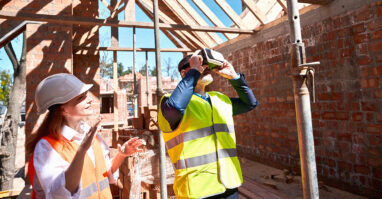Originally published in On-Site, ARB’s Construction Industry newsletter.
As you know, every construction project doesn’t require bonding. However, once your company starts working on jobs that do, your ability to obtain performance bonds of the requisite value becomes critical. They call it “bonding capacity” — and the strength of yours depends on your construction company’s past financial performance and future viability.
Capacity basics
A performance bond is a legally binding agreement involving a principal (the construction business), an obligee (the project owner) and the surety (the bond provider). The bond is a form of insurance that guarantees the construction company will fulfill the performance obligations of its contract with the owner. If it can’t, the surety assumes liability for replacing the principal or compensating the obligee for its losses.
More formally defined, individual or “single-job” bonding capacity is the maximum dollar value of any construction contract for which a surety will issue a bond. Sureties may also assess aggregate capacity — the total bonding limit for multiple jobs handled by one construction business.
Generally, bonding is required for publicly funded projects and some bigger or more complex privately funded ones. So, the higher your bonding capacity, the wider the selection of these potentially lucrative jobs you’ll have. Some owners may look into your capacity even when a bond isn’t required because an elevated capacity indicates a history of successfully completed projects.
Information, please
For smaller bonding needs — say, jobs valued at less than $500,000 — you may be able to secure a performance bond rather quickly based on just your business credit score. However, sureties typically engage in lengthier approval processes when larger dollar amounts are involved.
In these cases, they’ll scrutinize your company profile. This is basically a comprehensive summary of essential information about your construction business — such as its name, contact information, history, organizational structure, mission and vision statements, range of services, and notable awards or other achievements.
They’ll also want to study one or more sets of your financial statements, as well as additional documentation such as liquidity statements, cash flow projections and work-in-progress schedules. Sureties will likely request copies of your bank statements, too. And they may ask for a list of references and details about your most recently completed projects.
Method to madness
Sureties’ underwriting and decision-making processes can seem perplexing. Rest assured, there’s a method to their madness. The information they collect provides them with critical insights into your:
Financial stability. Sureties want to know you can pay the bills while you’re fulfilling your contractual obligations. To gather evidence, most use key performance indicators. A particularly important one is working capital, which is commonly calculated as current assets minus current liabilities. Other critical metrics include equity-to-backlog ratio and operating cash flow. More broadly, they look for sound accounting and financial management practices, such as reasonable budgeting and accurate cash flow projections.
Backlog. Sureties want to see that you’re steadily landing new contracts — without overcommitting operational resources, such as people and equipment. A sound number of projects in the pipeline provides evidence of future revenue, cash flow and the capacity for additional work. They want to be sure you’ll likely earn enough to cover your overhead and indirect costs.
Past performance. Sureties typically work from the premise that history is the best predictor of the future. Thus, they scrutinize the size and profitability of your recently completed jobs, including how your projections played out against actual costs.
Bond claims can prove more costly than you think
No construction business embarks on a project expecting its surety to enforce a performance bond. Unfortunately, unexpected circumstances can sometimes arise that make it impossible to complete a job as promised. As you might guess, what happens next is … not good.
Bond claims are usually filed by the obligee (project owner) when it’s clear the principal (construction company) has defaulted on the contract. In such a case, your surety will investigate and may give you the opportunity to remedy the situation. Absent a feasible remedy, you’ll be responsible for reimbursing the surety for its costs to find a new contractor or cover the owner’s losses. A financial hit like this could drastically undermine your cash flow and potentially threaten the solvency of your construction business.
Bond claims also damage your reputation, leaving project owners wary about awarding you bids and referral sources hesitant to recommend you. Moreover, just one bond claim, much less a history of them, makes it much harder to obtain performance bonds going forward.
Sureties also consider whether your construction company is experienced in the type of project for which you’re seeking a bond. At the very least they want evidence that you’re likely able to transition to that kind of job based on your established services and the skill sets of your leadership team and key employees.
In fact, if you’re particularly keen on increasing your bonding capacity, start diversifying your project types now to demonstrate the ability to execute various jobs. Varying your revenue streams can also protect your business from downturns in a specific sector.
Just ask
If you’re already working with a surety, don’t hesitate to ask your rep what you need to do to boost your bonding capacity. On the other hand, if you’re new to bonding, work with a qualified broker or advisor to find the right provider. In either case, your CPA can help you prepare financial statements and other forms of documentation to build your case.
This publication is distributed with the understanding that the author, publisher and distributor are not rendering legal, accounting or other professional advice or opinions on specific facts or matters, and, accordingly, assume no liability whatsoever in connection with its use. ©2024
Construction and Real Estate Team Spotlight

Nick Lagoditz, CPA, joined ARB in 2016 as an associate and became a tax manager in 2022. He provides tax preparation and business advisory services, with a focus on partnerships, real estate professionals, and construction businesses. Previous to ARB, Nick worked at a large international firm for nearly two years.






